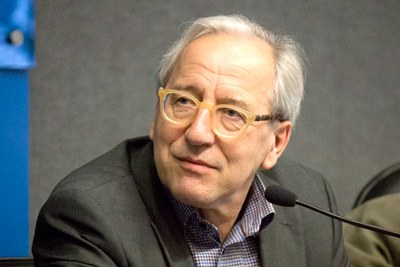‘There is nothing new under the sun’
São Paulo, April, 22, 2015
 Day III (April, 22) and we all become ethnographers. Professor Emeritus of the Goethe University Frankfurt, Karl Heinz Kohl brings our attention to the issue of time from an anthropological standpoint. Unlike the applied sciences, anthropology offers no single definition for ‘time’, making this a truly multifarious concept. Nevertheless, given the framework of an hour-long talk, Prof Heinz Kohl wishes to provide at least some selective concepts of time for the audience. First of all, he assures us that as a socially constructed notion, how people experience time is necessarily culturally embedded. This conceptualisation of time may well vary within neighbouring societies, if the modes of labour differ significantly.
Day III (April, 22) and we all become ethnographers. Professor Emeritus of the Goethe University Frankfurt, Karl Heinz Kohl brings our attention to the issue of time from an anthropological standpoint. Unlike the applied sciences, anthropology offers no single definition for ‘time’, making this a truly multifarious concept. Nevertheless, given the framework of an hour-long talk, Prof Heinz Kohl wishes to provide at least some selective concepts of time for the audience. First of all, he assures us that as a socially constructed notion, how people experience time is necessarily culturally embedded. This conceptualisation of time may well vary within neighbouring societies, if the modes of labour differ significantly.
He presents us with an iconic image of Charlie Chaplin’s film-still from Modern Times of 1936, where the ‘comic’ social commentator shows how man has become a slave to modernity because of continuous labour patterns and perpetual notions of time. In the field of anthropology (and beyond) time was considered for many years as progressive and linear. With the invention of the pocket watch and the train, mankind became obsessed with keeping time, making time, saving time, measuring time, beating time, investing time and never wasting time. It is safe to say that with the Industrial revolution and zealous modernisation, man’s concept of time broke away from the natural cycles that had dominated for centuries if not millennia.
Time, and the manipulation of it, went hand in hand with the idea of progress. Those who were seen to be unable to ‘keep up with the times’, were dismissed as uncivilised, backward, savage. However, there soon came some reconceptualisations regarding the issue of time and a call for relativism in this field. As anthropologists became more interested and sympathetic to the study of ‘other’ cultures, they soon noted how time could be cyclical, especially in agrarian communities. This realisation seemed to highlight the rigidity of the Western concept of time as linear and compartmentalised, calling into question its validity and perhaps even benefits for modern man. Prof Heinz Kohl stresses how ancient mythologies from across the globe have portrayed time as cyclical rather than linear, so that the present is in fact a repetition of the past.
Linking his talk to previous ones, Prof Heinz Kohl notes how Hinduism and Buddhism extend this cyclical notion of time to the origin of the universe, so that if an eventual ‘Big Crunch’ follows on from a ‘Big Bang’, this would in fact be a renewal the cosmos, not the end of it. He also brings our attention to the modern mythologies of the Aborigines in Australia, whose Dream Time centres round realities in parallel universes, which are repeated in our earthly world in a cyclical manner. Prof Heinz Kohl concludes his talk with a well-known quote from King Solomon - ‘There is nothing new under sun’ – thereby implying a cyclical quality to the issue of time. This notion of perpetual repetition or cyclical nature of time seems to offer a more bearable existence for mankind in both the short and long term. His talk ignited a variety of questions from scholars across the fields, making this a truly stimulating and interdisciplinary approach to time.
